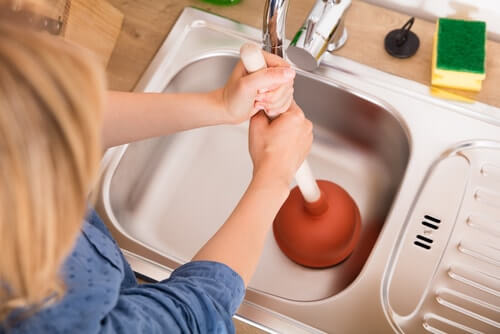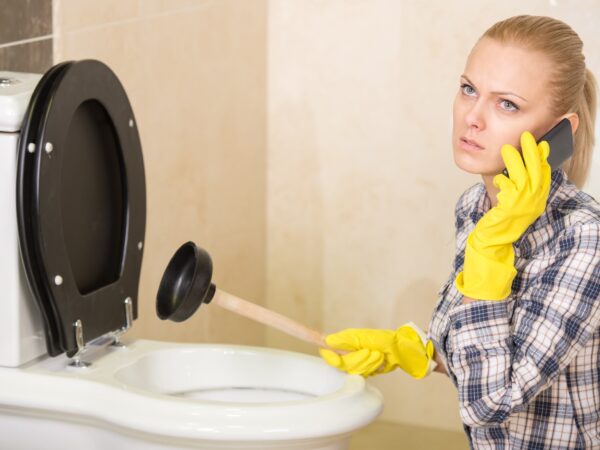This post directly below pertaining to Expert Tips for Managing a Plumbing Emergency Until Help Arrives is unquestionably entertaining. Read on and draw your own personal results.

Pipes emergency situations can strike at any moment, creating stress and prospective damages to your home. Whether it's a burst pipeline, a clogged drain, or a dripping faucet, understanding exactly how to take care of the situation up until a specialist plumbing arrives can save you from more complications. This short article supplies necessary emergency plumbing ideas to aid you mitigate damages and reclaim control throughout a pipes crisis.
Turn Off the Supply Of Water
The primary step in any kind of plumbing emergency is to turn off the water system. For local issues, such as a dripping tap or toilet, turn off the valve near the fixture. When it comes to a significant leakage or burst pipe, locate your home's primary water shut-off shutoff and transform it off quickly. Recognizing the place of these shutoffs ahead of time can conserve beneficial time throughout an emergency.
Shut Off Your Water Heater
In certain emergency situations, such as a ruptured pipeline, it's important to turn off your hot water heater. This protects against getting too hot or damages to the system when water quits moving. Switch off the power supply to the hot water heater (electrical or gas) and allow it cool off to avoid potential risks.
Temporarily Stop a Burst Pipe
A burst pipe can lead to substantial water damages in mins. To alleviate the problem:
- Clamp or Wrap the Pipe: Use a pipe clamp, rubber, or duct tape as a temporary seal.
- Divert Water Flow: If possible, draw away the water right into a pail or container to limit damages to bordering locations.
- Maintain the Area Dry: Use towels or a wet/dry vacuum to remove standing water.
- Call an expert plumbing technician promptly to attend to the issue permanently.
Have an Emergency Pipes Set
Prepare a fundamental plumbing emergency package to manage small issues effectively. Your package should consist of:
- Flexible wrench
- Plumbing technician's tape
- Pipe clamps
- Towels and dustcloths
- A bettor
- Epoxy putty
- Bucket.
- Having these devices available can make a significant distinction in your capability to manage emergency situations.
Unclog Drains Pipes Safely.
A clogged drainpipe can be a discouraging and messy issue. Right here's how to tackle it:. - Make use of a Plunger: For sinks or toilets, a bettor can frequently displace small obstructions. Ensure you make use of the appropriate type of bettor for the component.
- Hot Water and Dish Soap: For grease-related blockages, pour a combination of warm water and dish soap away to separate the grease.
- Avoid Chemical Drainpipe Cleansers: While tempting, chemical cleaners can create more injury than great, especially to older pipelines.
- If these methods do not work, stay clear of using too much pressure, as it may get worse the obstruction.
Take Care Of Overflowing Toilets.
An overflowing commode can trigger prompt mayhem. Below's what you ought to do:. - Quit the Water Flow: Get rid of the container lid and weigh down on the flapper valve to quit water from getting in the bowl. Switch off the supply of water to the commode if necessary.
- Dive Gently: Make use of a bathroom bettor to clear the obstruction, yet prevent hostile plunging, which can cause splashing or more damage.
- Consist of the Spill: Usage towels or a mop to clean up water swiftly to stop flooring damages.
Address Tiny Leaks with Momentary Solutions.
Small leaks can swiftly end up being considerable issues if left untreated. Make use of these momentary solutions until expert help shows up:.
- Pipeline Tape or Epoxy Putty: Use water resistant tape or epoxy putty to momentarily seal the leakage.
- Rubber and Clamp Technique: Cover an item of rubber or an old internal tube around the leak and secure it with a pipe clamp or duct tape.
- Pails or Towels: Place buckets under the leak to include water and stop damages to floor covering or furnishings.
- While these fixes aren't permanent, they can assist reduce water loss and damages.
Handle Frozen Piping Carefully.
In colder environments, icy pipelines are an usual emergency situation. If you suspect a frozen pipeline:. - Turn Off the Water: Shut down the major water supply to avoid a ruptured pipeline.
- Defrost Gradually: Make use of a hairdryer, hot pad, or cozy towels to thaw the pipeline progressively. Stay clear of open fires or severe warm, as these can harm the pipeline.
- Check for Leakages: Once the pipe is thawed, check for fractures or leaks before turning the water back on.
Know When to Call a Professional.
While quick fixes can help momentarily, particular plumbing problems require immediate specialist focus. Call a plumbing professional if:.
- A ruptured pipe causes substantial flooding.
- Drains or commodes stay blocked in spite of your efforts.
- You see relentless leakages or water pressure issues.
- Your hot water heater is dripping or malfunctioning.
- Immediately getting in touch with a specialist makes certain the concern is solved properly and avoids further difficulties.
Stop Additional Damage.
Taking quick activity to minimize damages can conserve you time and money in the long run. Right here's how:. - Relocate Valuables: Eliminate furniture, electronic devices, and other items from the damaged area.
- Usage Sandbags: For flooding situations, place sandbags around the location to redirect water.
- Shut down Electrical energy: If water has gotten to electric outlets or appliances, switch off the electrical energy to avoid shocks or fires.
Verdict.
Plumbing emergency situations can be overwhelming, but with the ideal knowledge and devices, you can manage the scenario successfully till assistance arrives. By turning off the water system, addressing tiny leaks, and utilizing temporary repairs, you can minimize damages and keep your home safe. Bear in mind, these suggestions are short-lived services; always consult an accredited plumber to manage the root cause of the issue. Prep work and quick reasoning are your best allies in any kind of plumbing emergency situation.
8 Helpful Tips for Managing Plumbing Emergencies at Home
If your plumbing system hasn’t failed once, wait for it because almost everyone has a story to tell. Sometimes, it could be simple emergencies such as a leaking pipe, a blocked cistern, or even a big burst pipe. In situations like this, you need to have some handy tips to save you some money and from possible damages.
Take care of minor issues early.
Sometimes, you could have avoided an emergency by taking proactive measures while it was still early. Some major plumbing emergencies can be a result of an ignored minor issue. We recommend that you have items like plumbing tapes and other related items. A plumbing tape can allow you to manage minor leaks before the plumber arrives.
Cut off the water supply.
This tip is essential in almost any type of leakage problem. For problems like minor leakages in the toilet or kitchen, turn off the supply that takes water to the affected pipes. If the leakage is a major pipe, you must shut off the supply valve to the entire building. This will help you avoid flooding your home and neighbors if you share a flat.
Know your plumbing system
Folks typically move into a new apartment without understanding the water supply around the building. This can prove disastrous if a water emergency arises and the plumber is far away. The previous tip will prove useless if you don’t practice this one. More importantly, know where your water shut-off valve is located – you’ll need that knowledge to prevent potential home floods.
Have some common handy tools
There are lots of plumbing emergencies that you can handle without hiring a plumber. That’s why you must keep some tools available always. Some tools that you can use to fix simple plumbing emergencies easily include plumbing tapes, screwdrivers, thread seal tapes, plungers, pliers, tape measures, and rubber gloves.
Insulate your pipes from cold
You’ll save yourself from many plumbing expenses if you protect your water pipes from the cold. This is because of the harmful effects that cold weather can have on your pipes. During winter, your pipes can burst from being overly expected to freezing temperatures. So, make sure insulators are there to keep the pipes working correctly.
Avoid practices that will clog your toilet.
Many people indulge in practices that can damage the plumbing system of the entire building. One of these is when they use their toilet to dispose-off garbage. They flush all kinds of things, such as paper towels, bandages, hairs, female sanitary products, etc., down the toilet. This will block your toilet in the long run, incurring unnecessary expenditures. Dump such waste in the trash instead.
Check your dials regularly.
Sometimes, there could be leakages in your home without noticing them in time. So, constantly monitor your water meter dial. If the dial is reading when there is nobody using water, this is an indicator that there is leaking. Check for leaks immediately. Call a plumber as soon as possible if you can’t find any.
https://www.constructionplacements.com/8-helpful-tips-for-managing-plumbing-emergencies-at-home/

As a passionate person who reads on Expert Tips for Managing a Plumbing Emergency Until Help Arrives, I think sharing that portion was a smart idea. Loved our post? Please share it. Let others check it out. Thanks so much for your time spent reading it.
Click Here
Comments on “Quick Solutions for Emergencies Until Help Arrives”